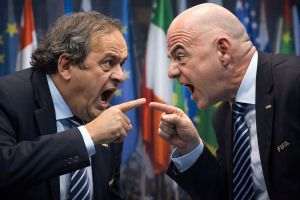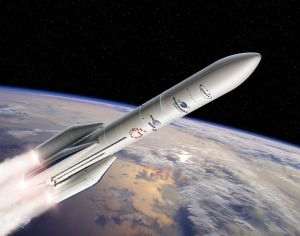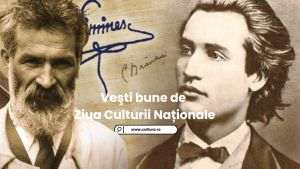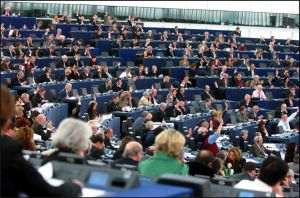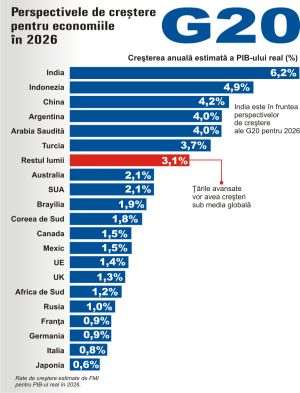The European celebration of football begins today. With a one year delay. Better later than very late. Involved in its organization, but not as competitors, we are waiting to see what a great competition looks like under lockdown. We have to admit we haven't been very lucky. It's not the absence of the team from the competition, maybe it's for the best that they didn't qualify, considering how badly they play, we didn't have the luck of the draw. All the best about the guests, but Austria, Northern Macedonia and Ukraine, the teams that will meet in the first three games from the National Arena, are not exactly the type that you put on a poster. We are at a banquet where the dishes are bland, diet ones. At last that is the impression before the beginning, maybe we'll get some pleasant surprises. Moreover, thanks to the TV sets we can watch the arenas of Copenhagen, London, Munich, Budapest, Rome, Amsterdam or Baku, Seville, Glasgow, Sankt Petersburg, to watch teams that are closer to the tastes of each of us. The important thing for us is to find a reason to rejoice, because that's what football is about when you are involved in it as just a supporter. Succeeding in finding an island of relaxation in an sea of problems. Because problems haven't been invented with the pandemic.
In 1982, at the first championship I watched fully, on the Bulgarian TV, the local communism had serious economic issues, and adults around me were upset over the shortage of food in stores. I don't remember anymore what I ate back then, but the championship in Spain was beautiful. Four years later, the same communist system was thinking of systematizing our village, in other words tearing down our home. The tension was high, but Maradona managed to make us happy. The home stayed up, communism fell, and in 1990, after the first months of tasting freedom, we began seeing the less pleasant part of original democracy and having our own problems. Miners were beating up people in Bucharest in June back then, but the national team beat the USSR and we were happy for a minute. Problems aren't just general, they are also individual.
In 2000, I was focused on one thing, I was going to be a father, and I was hugely nervous. The emotions of the Romania - England match almost caused a premature birth, because women are also football fans. It was all good in the end. We were happy, in fact that was the last time Romania ever won anything in a final. In 2010, before the start of the World Cup, I was between two newsrooms, i.e. unemployed. During the championship I found joy and a job. Problems never end, but from time to time we can put them "on hold" and with a drop of hope in our hearts, move on, regardless of direction. May we be healthy, because trouble will come no matter what!
Bucharest's issues
It has become a tradition to try and point as much as possible local shortcomings, especially if we think that we are not to blame for them. If we are directly involved, we boast. Bucharest's issues are well known, it doesn't take the beginning of EURO 2020 to find that the city has some problems every now and then, each one of us says to himself or to one of their friends that Bucharest is not very friendly to its residents. The grass is kinda sparse in parks, access from Otopeni is difficult, the subway line has not been built, taxi drivers aren't saints, a and not even the stadiums built for this occasion aren't 100% ready. Criticism is in full swing. But the officials are seeing things differently. Former football player Gheorghe Popescu announces that it has been an honor for him to coordinate the organization of Euro-2020 in Bucharest: "Today was the last meeting of the Interministry Committee for the organizing of EURO 2020, before the start of the competition. It has been an honor and a challenge for me to coordinate the most interesting and complex sports project organized by Romania. The first meeting was in February 2018. There were dozens of meetings. Aside from their number, I remember each one. In my career, in addition to the domestic and international trophies won with the club teams, and the 116 matches played for the national team, I will always be proud of the fact that I have contributed to our country and Bucharest being at a high level, among the countries and the cities that will host this final European Championship tournament. During these 3 and a half years, I worked with the representatives of the Government, of the National Investment Company and its partners, of the Romanian Football Federation and of the Mayoralty of Bucharest. I am grateful to all of them".
It bears remembering: at the highest level. But what do the guests say? Ukraine's coach, Andrey Shevchenko is very pleased with the organization and accommodations: "We have been well received here, we are happy to be in Bucharest. The organization and the conditions here are very good. We are also in contact with Florin Cernat (ed. note: former international player who also played in Ukraine), he is helping us with what we need, he is very helpful". Definitely Ukrainian supporters will be less kind, because many of them won't be living in 5-star hotels and they won't be able to travel through the car with a luxury bus accompanied by police. One aspect that need to be taken seriously, supporters' opinion can be very heavily influenced by the results of their own team and by how much beer they've had after a win.
We're hosting four matches, let's enjoy them!
Romanians and Azeris, the only host countries not playing in this championship
Of the 11 host countries, only Romania and Azerbaijan failed to qualify for EURO 2020. The situation is not pleasant at all, but unfortunately this absence is not an accident, but is the effect of the steady decline of the Romanian football team in all respects.
Ambassador to Bucharest of the final tournament of the European Championship, former international player Dorinel Munteanu discussed this less pleasant situation: "Unfortunately, our team is not present in this event. Honestly, I don't know if there are any countries hosting the EURO 2020 competition that aren't participating... I think that it's just us and Azerbaijan that have failed to qualify. Pity. It is clear that it would have been a good thing for us as, hosts, to be part of the competition. We had our chance, but it is what it is. (...) Given how the match with Iceland was approached, there is no doubt that the coach's lack of experience also had some impact. But I think that even had we beat Iceland, we would have ended up going against Hungary in the final of the qualifiers. And I think at the moment, from what I've seen, it would have been very hard to beat Hungary and qualify. Because Hungary has proven to be a solid and growing team. (...) Given the situation that Romanian football is in today, I think that the hosting of three games within the groups and one of the rounds of eight in the European Championship is the best opportunity in terms of perception. I am happy for Romania, I am happy for Romanian fans who will have the opportunity to see such a tournament in their country. And I hope the organization will be beyond reproach and everything works out well".
INSERT 2
France, the great favorite
World Champion, France is the great favorite when it comes to winning the trophy. Betting houses, mathematicians statisticians and powerful computers indicate that. Current world champion France is the main favorite to win the European football championship, according to a calculation from several European universities. Math researchers from the Universities of Gent (Belgium), Innsbruck (Austria), Molde (Norway), Dortmund and Munich (Germany) have calculated the odds of teams that will participate in the tournament between June 11 and July 11. According to their results, France has the greatest odds (14.8%) of picking up the Henri-Delaunay trophy on July 11, on London's Wembley stadium. Les Bleus are followed by England (13.5%), Spain (12.3%), Portugal, current title holder and Germany (both with 10.1%), Belgium (8.3%), Italy (7.9%), Holland (6.1%) and Denmark (4.6%). In order to reach this result, researchers have analyzed several data sets, such as the results of the teams in question over the last eight years, the rates in 19 betting houses, the performance of their players for their clubs and their national teams etc. Based on all of the above, a computer than conducted 100,000 simulations of the EURO 2020 matches.
According to a study performed by Stats Perform Predictor, France, the current world champion, is considered as the most likely to win the European title (20.5%), followed by Belgium, ranked third in the 2018 World Cup (15.7%). The two favorites are followed by Spain (11.3%), Germany (9.8%) and Portugal, the holder of the European title (9.3%). The lowest odds at winning the trophy (0.02%) are those of Northern Macedonia.
INSERT 3
The European Championship finals
2016 (France) Portugal - France 1-0 (after the extended rounds)
2012 (Poland and Ukraine) Spain - Italy 4-0
2008 (Austria şi Switzerland) Spain - Germany 1-0
2004 (Portugal) Greece - Portugal 1-0
2000 (Holland şi Belgium) France -Italy 2-1 (golden goal)
1996 (Anglia) Germany - Czech Republic 2-1 (golden goal)
1992 (Sweden) Denmark - Germany 2-0
1988 (Germany) Holland - USSR 2-0
1984 (France) France - Spain 2-0
1980 (Italy) Germany - Belgium 2-1
1976 (Yugoslavia) Czechoslovakia - Germany 2-2, 5-3 after penalties
1972 (Belgium) Germany - USSR 3-0
1968 (Italy) Italy - Yugoslavia 2-0
1964 (Spain) Spain - USSR 2-1
INSERT 4
Goalgetters of the finals
1960: 2 François Heutte (France), Viktor Ponedelnik (USSR), Valentin Ivanov (USSR), Dra¾an Jerković (Yugoslavia), Milan Galić (Yugoslavia)
1964: 2 Jesús María Pereda (Spain), Ferenc Bene (Hungary), Deszö Novak (Hungary)
1968: 2 Dragan D¾ajić (Yugoslavia)
1972: 4 Gerd Muller (Federal Republic Of Germany)
1976: 4 Dieter Muller (Federal Republic Of Germany)
1980: 3 Klaus Allofs (Federal Republic Of Germany)
1984: 9 Michel Platini (France)
1988: 5 Marco van Basten (Holland)
1992: 3 Henrik Larsen (Denmark), Karl-Heinz Riedle (Germany), Dennis Bergkamp (Holland), Tomas Brolin (Sweden)
1996: 5 Alan Shearer (England)
2000: 5 Patrick Kluivert (Holland), Savo Milo¹ević (Yugoslavia)
2004: 5 Milan Baro¹ (Czech Republic)
2008: 4 David Villa (Spain)
2012: 3 Fernando Torres (Spain), Alan Dzagoev (Russia), Mario Gomez (Germany), Mario Mand¾ukić (Croatia), Mario Balotelli (Italy), Cristiano Ronaldo (Portugal)
2016: 6 Antoine Griezmann (France)
INSERT 5
Dedicated "domain"
As we have accustomed you for more than a decade, BURSA will again have a section dedicated to this athletic event. On https://www.bursa.ro/euro-2020 you will be able to find daily information, opinions, analyses, as well as statistics concerning scores, goal getters, rankings, game schedules. The game will be tight, but one winner will come out: the readers.
INSERT 6
The tournaments' protocols
The lockdown has brought several changes when it comes to the final competition: fewer host cities, 11 compared to the initially established 12, reduced maximum capacity on stadiums, strict Covid-19 protocols and involve travel restrictions and coronavirus testing requirements. UEFA has decided that each lot will be made of 26 players instead of 23. That was done in order to allow participating nations to have enough resources even if some players tested positive with coronavirus or if some of them needed to stay isolated after coming into contact with infected persons. There is the possibility of matches being postponed by at most 48 hours if the teams have less than 13 available players and for additional players to be brought in, but only if the quarantined players are permanently removed from the 26-player lot. Still, if a team can't participate in a game 48 hours after the initial date of the match, the game will no longer be played and the team with infected players will lose the game 0-3. UEFA hopes that the existing protocols, consisting of safe "bubbles" for players, staff and key personnel, will help prevent disturbance of the competition. Players and staff will not have to come into direct contact with the media, to avoid the risk of spreading the virus. Press conferences will be hosted online. The cities hosting the games have committed to keep the number of watchers low, among the organizers only Budapest will have full stadiums, but with improved safety procedures and strict requirements for all those entering the stadium. In Munich, a maximum of 14500 fans will be able to attend a match (about 22 percent of the total capacity), and on Wembley at least 22500 fans will be able to attend (25%). In Seville, the La Cartuja stadium will be 30% filled (18,000 people), while the stadiums of Baku and Sankt Petersburg will receive 50% of the number of watchers they can accommodate.
Some host countries may increase the number of spectators during the tournament, depending on the restrictions in force in those countries. Wembley Stadium, which will host the semi-finals and final, may be at full capacity, with 90,000 fans in the stands, in the upper rounds, if the British authorities' plans to drop the restrictions on June 21 remain unchanged.
In terms of entering stadiums to watch matches, each city has different testing requirements for fans. A valid match ticket and a negative coronavirus test or vaccination proof are required to obtain the Covid-19 bracelet.
In the cities that host European matches, the ticket holders will have various time slots for entering the stadium, and their temperature will be checked and there is also the possibility for some arenas to do quick Covid tests. The rules require that some fans arrive at the stadium three hours before the start of the match. Whereas participating teams benefit from exceptions that allow all players and staffs with accreditation to travel freely between the venues of the competition, for fans the trips will be quite difficult, due to the rules that differ from city to city.

